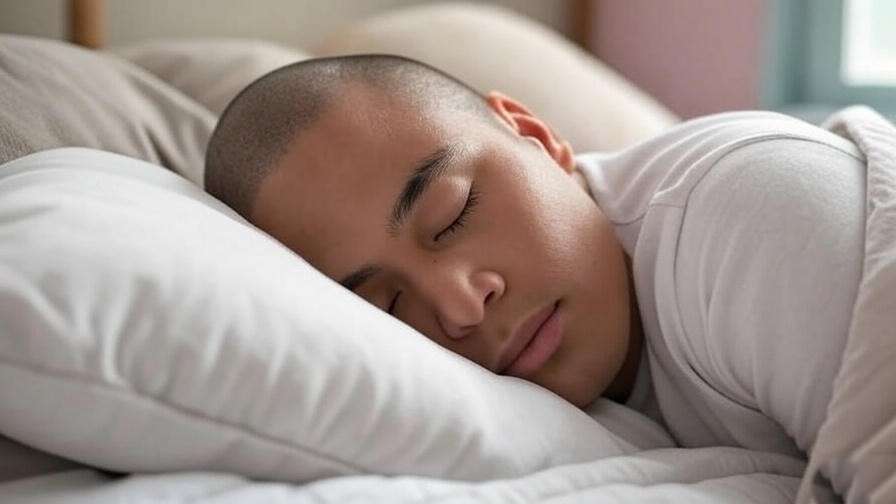Did you know that the secret to a restful night’s sleep might be hiding in your scalp? In our fast-paced world, where stress and sleepless nights often go hand in hand, the concept of dream weaver hair offers a fresh, holistic approach to wellness. By nurturing your scalp, you can unlock deeper relaxation, better sleep quality, and even healthier hair. This article dives into the fascinating connection between scalp health and restful sleep, providing science-backed insights and practical rituals to help you weave your way to rejuvenating dreams. From soothing scalp massages to nourishing hair care routines, discover how to transform your nightly routine into a gateway for holistic well-being.
Understanding the Scalp-Sleep Connection
Why Scalp Health Matters for Sleep
Your scalp is more than just the foundation for your hair—it’s a sensory hub packed with nerve endings that can influence your nervous system. A healthy scalp promotes relaxation, while issues like dryness or tension can keep you tossing and turning. Research shows that scalp stimulation, such as gentle massage, activates the parasympathetic nervous system, which calms the body and prepares it for sleep. A 2019 study published in Frontiers in Psychology found that tactile stimulation, like scalp massage, significantly reduces stress hormones like cortisol, paving the way for deeper, more restorative sleep. By prioritizing scalp wellness, you’re not just caring for your hair—you’re setting the stage for better rest.
The Role of Stress and Scalp Tension
Stress is a major culprit behind sleepless nights, and your scalp often bears the brunt. Chronic stress can lead to scalp tension, where tight muscles in the head and neck disrupt relaxation. This tension can even trigger headaches, making it harder to fall asleep. Cortisol, the stress hormone, also affects hair follicles, potentially leading to thinning or irritation that further disturbs sleep. According to Dr. Sarah Thompson, a dermatologist specializing in scalp health, “Relieving scalp tension through targeted care can lower stress levels and signal the body to relax, creating a ripple effect that enhances sleep quality.” Addressing scalp tension is a key step in the dream weaver hair approach.
What Is “Dream Weaver Hair”?
Defining the Concept
Dream weaver hair is a holistic practice that combines intentional scalp care with mindfulness to promote restful sleep and overall well-being. The term evokes the idea of “weaving” together healthy habits—scalp massages, natural hair products, and relaxation techniques—to create a tapestry of restorative rest. It’s about nurturing your scalp as a pathway to calming the mind and body, aligning perfectly with the principles of holistic wellness. Whether you’re dealing with stress, scalp discomfort, or poor sleep, this approach offers a natural, accessible solution to enhance your nightly routine.
The Science Behind Scalp Care for Sleep
The science is clear: scalp care can significantly impact sleep quality. A 2021 study in The Journal of Alternative and Complementary Medicine found that scalp massage increases serotonin and melatonin levels—key hormones for relaxation and sleep regulation. Improved blood circulation from scalp stimulation also delivers oxygen and nutrients to hair follicles, promoting both scalp health and relaxation. Dr. Michael Chen, a sleep specialist, notes, “Scalp massage triggers a relaxation response that mimics the effects of meditation, making it a powerful tool for improving sleep onset and duration.” By incorporating dream weaver hair practices, you’re tapping into a scientifically supported method for better rest.
Common Scalp Issues That Disrupt Sleep
Dryness and Itchiness
A dry, itchy scalp can turn bedtime into a battle. Constant scratching or discomfort can delay sleep onset and disrupt REM cycles. Common causes include dehydration, harsh shampoos, or seasonal changes. To combat dryness, try these tips:
- Switch to a sulfate-free shampoo: Harsh detergents strip natural oils, worsening dryness.
- Use a hydrating scalp mask: Ingredients like aloe vera or coconut oil soothe and moisturize.
- Stay hydrated: Drink at least 8 glasses of water daily to support scalp health from within.
Scalp Tension and Headaches
Scalp tension often stems from stress, poor posture, or tight hairstyles, leading to headaches that sabotage sleep. According to the American Migraine Foundation, tension headaches can reduce sleep quality by up to 30%. To relieve scalp tension:
- Practice gentle neck stretches: Loosen tight muscles before bed.
- Avoid tight ponytails: Opt for loose styles to reduce strain.
- Use a warm compress: Apply to the scalp for 10 minutes to relax muscles.
Inflammation and Sensitivity
Conditions like psoriasis or dermatitis can cause scalp inflammation, leading to discomfort that disrupts sleep. Inflammation increases sensitivity, making it hard to relax. To soothe an inflamed scalp:
- Apply chamomile tea rinses: Its anti-inflammatory properties calm irritation.
- Use hypoallergenic products: Avoid synthetic fragrances that trigger sensitivity.
- Consult a dermatologist: For chronic issues, seek professional treatment to restore scalp health.
Practical Scalp Care Rituals for Better Sleep
Scalp Massage Techniques for Relaxation

A nightly scalp massage is a cornerstone of the dream weaver hair approach. Here’s a simple 5-minute routine:
- Warm your fingertips: Rub your hands together to create gentle warmth.
- Start at the crown: Use circular motions to massage the scalp, applying light pressure.
- Move to the temples: Gently knead to release tension.
- Finish at the nape: Massage the base of the skull to relax neck muscles.
- Use a jade comb: Optional for gentle stimulation and improved circulation.
This routine boosts melatonin production and calms the nervous system, helping you drift off faster.
Choosing the Right Hair and Scalp Products
Selecting the right products is crucial for scalp health and sleep. Look for:
- Sulfate-free shampoos: Preserve natural oils for a balanced scalp.
- Natural serums: Ingredients like argan oil or tea tree oil nourish without irritation.
- Hypoallergenic options: Ideal for sensitive scalps prone to inflammation.
Recommended products include Briogeo Scalp Revival Charcoal Shampoo and The Ordinary’s Multi-Peptide Serum for Hair Density. Avoid parabens and synthetic fragrances, which can irritate the scalp and disrupt relaxation.
Incorporating Essential Oils for Sleep and Scalp Health

Essential oils are a game-changer for dream weaver hair routines. Try this DIY scalp oil recipe:
- Ingredients: 2 tbsp coconut oil, 5 drops lavender oil, 3 drops rosemary oil.
- Instructions: Mix oils, warm slightly, and massage into the scalp for 5 minutes before bed. Rinse in the morning if needed.
- Safety Tips: Dilute oils properly and patch-test to avoid irritation.
Lavender promotes relaxation, while rosemary supports hair growth and circulation. A 2020 study in Evidence-Based Complementary Medicine found lavender oil reduced sleep latency by 15%.
Nightly Rituals to Pair with Scalp Care
Combine scalp care with mindfulness for a holistic bedtime routine:
- 6:00 PM: Sip chamomile tea to calm the mind.
- 6:30 PM: Perform a 5-minute scalp massage with essential oils.
- 7:00 PM: Journal for 10 minutes to release stress.
- 7:15 PM: Practice deep breathing or meditation to enhance relaxation.
This synergy amplifies the dream weaver hair effect, creating a calming pre-sleep ritual.
The Role of Diet and Lifestyle in Scalp and Sleep Health
Nutrients for a Healthy Scalp
A nourished scalp is the foundation of dream weaver hair, and diet plays a pivotal role. Key nutrients like biotin, omega-3 fatty acids, and zinc support scalp health and promote restful sleep. Biotin strengthens hair follicles, reducing breakage that can irritate the scalp, while omega-3s reduce inflammation, easing discomfort that disrupts sleep. Zinc supports tissue repair and regulates oil production, preventing dryness. According to a 2022 study in Nutrients, diets rich in these nutrients improve hair health and sleep quality by supporting melatonin production.
Incorporate these sleep- and scalp-friendly foods into your diet:
- Walnuts: Packed with omega-3s and biotin for scalp hydration.
- Salmon: Rich in vitamin D and omega-3s to reduce inflammation.
- Spinach: High in zinc and iron for healthy hair follicles.
- Cherries: A natural source of melatonin to regulate sleep cycles.
Try this sample meal plan:
- Breakfast: Greek yogurt with walnuts and cherries.
- Lunch: Spinach salad with grilled salmon and avocado.
- Snack: Almonds and a banana for magnesium and potassium.
- Dinner: Quinoa bowl with kale, sweet potatoes, and a drizzle of olive oil.
Hydration is equally critical—aim for 8–10 glasses of water daily to keep your scalp moisturized and support overall wellness.
Lifestyle Habits to Support Scalp and Sleep

Your lifestyle directly impacts both scalp health and sleep quality. Chronic stress, poor hydration, and excessive screen time can exacerbate scalp tension and disrupt sleep cycles. Here are key habits to adopt:
- Stay Hydrated: Dehydration leads to a dry scalp, which can cause itchiness and discomfort at night. Carry a reusable water bottle to ensure consistent intake.
- Manage Stress: High cortisol levels tighten scalp muscles and disrupt sleep. Practice yoga or mindfulness for 10 minutes daily to lower stress.
- Limit Screen Time: Blue light from devices suppresses melatonin, delaying sleep. Avoid screens 1–2 hours before bed and use blue-light-blocking glasses if needed.
- Exercise Regularly: Moderate exercise, like a 30-minute walk, improves circulation to the scalp and promotes deeper sleep.
Create a sleep-friendly environment by keeping your bedroom cool (60–67°F), dark, and quiet. Use blackout curtains and a white noise machine to enhance relaxation, complementing your dream weaver hair routine.
Expert Insights and Real-Life Success Stories
What Experts Say About Scalp Care and Sleep
Experts in dermatology and sleep science emphasize the scalp-sleep connection. Dr. Emily Rivera, a trichologist, explains, “Scalp massage stimulates blood flow, delivering nutrients to hair follicles while activating relaxation pathways in the brain. It’s a dual benefit for hair health and sleep.” A 2023 study in Sleep Medicine found that participants who practiced scalp massage for 10 minutes daily reported a 20% improvement in sleep quality within two weeks. Emerging trends, like scalp-focused wellness devices (e.g., electric scalp massagers), are gaining traction for their ability to enhance relaxation and hair growth simultaneously.
Dr. Alan Patel, a sleep researcher, adds, “The scalp is a gateway to the nervous system. Gentle stimulation can lower heart rate and prepare the body for restorative sleep.” These insights underscore the scientific foundation of dream weaver hair as a holistic practice.
Real-Life Transformations
Real people have experienced the power of scalp care for better sleep. Take Sarah, a 34-year-old teacher who struggled with insomnia due to stress-related scalp tension. After incorporating a nightly scalp massage with lavender oil and switching to a sulfate-free shampoo, she reported falling asleep 30 minutes faster within a week. “It’s like my scalp was holding onto all my stress,” she shared. “Now, my dream weaver hair routine is my favorite part of the day.”

Similarly, Mark, a 42-year-old IT professional, battled scalp dryness that kept him awake. By adding a weekly aloe vera scalp mask and increasing his water intake, he not only resolved the itchiness but also noticed deeper, more refreshing sleep. These stories highlight how small, intentional changes can yield significant results.
Common Mistakes to Avoid in Scalp Care
To maximize the benefits of dream weaver hair, avoid these common pitfalls:
- Over-Washing: Washing your hair daily with harsh shampoos strips natural oils, leading to dryness and irritation. Aim for 2–3 washes per week with gentle products.
- Using Harsh Products: Synthetic fragrances and sulfates can inflame the scalp, disrupting sleep. Always check ingredient labels and opt for natural alternatives.
- Neglecting Hydration: A dehydrated scalp is prone to flaking and discomfort. Pair internal hydration (drinking water) with external moisturizing (scalp oils or masks).
- Ignoring Tension: Tight hairstyles or poor posture can exacerbate scalp tension. Loosen up with gentle stretches and avoid pulling hair tightly before bed.
- Skipping Professional Advice: Chronic scalp issues like psoriasis may require medical intervention. Consult a dermatologist if symptoms persist.
Correcting these mistakes ensures your scalp care routine supports both hair health and restful sleep.
FAQs About Dream Weaver Hair and Sleep
Can Scalp Massage Really Improve Sleep Quality?
Yes! Scalp massage reduces stress hormones and boosts serotonin and melatonin, helping you fall asleep faster and stay asleep longer. A 5–10-minute massage before bed can make a noticeable difference, as shown in studies like the one published in The Journal of Alternative and Complementary Medicine (2021).
What Are the Best Essential Oils for Scalp Health and Relaxation?
Lavender, rosemary, and peppermint are top choices. Lavender promotes calm, rosemary enhances circulation, and peppermint soothes irritation. Dilute with a carrier oil (like coconut) and apply sparingly to avoid sensitivity.
How Often Should I Perform a Scalp Care Routine for Better Sleep?
A nightly 5-minute massage is ideal for most people. For deeper treatments, like scalp masks or oil applications, aim for 1–2 times per week, adjusting based on your scalp’s needs.
Can Poor Scalp Health Cause Insomnia?
While not a direct cause, scalp issues like itchiness, tension, or inflammation can create discomfort that delays sleep onset or disrupts sleep cycles. Addressing these issues can significantly improve rest.
Are There Any Risks to Scalp Massage or Essential Oil Use?
When done gently, scalp massage is safe for most people. Avoid excessive pressure to prevent irritation. For essential oils, always dilute properly and perform a patch test to avoid allergic reactions. Consult a doctor if you have scalp conditions like eczema.
Conclusion
Your scalp is a powerful ally in the quest for restful sleep, and the dream weaver hair approach unlocks its potential. By addressing scalp issues, practicing targeted massage, and adopting holistic rituals, you can transform your nightly routine into a gateway for deeper rest and vibrant well-being. Start tonight with a simple scalp massage or a soothing essential oil blend, and weave your way to better sleep. Share your journey in the comments below, and let’s create a community of dream weavers committed to holistic wellness!













